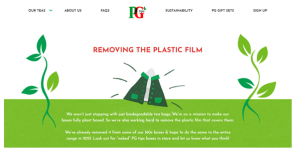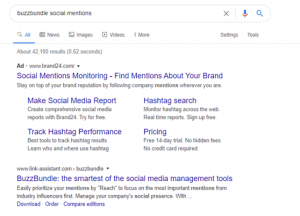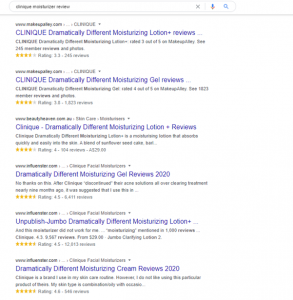As an E-Commerce business owner, you probably understand the value of lead generation. You spend lots of time managing social media marketing, email campaigns, and SEO to reach your target audience as much as possible. The more leads you collect, the greater the likelihood of conversions, right?
Well, not exactly.
That is because customers today practice caution, and why wouldn’t they?
They have the luxury to choose from a multitude of online businesses offering the same thing. So they only want to buy the product from a brand that fits their criteria (must be gluten-free, vegan, and kosher!). Search engines have made it infinitely easy for them to discover such information. All they have to do is type in a brand’s name, and there are pages upon pages of testimonials right at their fingertips.
But what happens if your business name returns a slew of negative information?
Poor customer reviews, lack of verified pages, sparse public listings, and even no information at all can prevent a lead from converting into a customer. This means that just having a great website, fantastic blogs, or engaging videos is futile without considering user feedback.
That’s where online reputation management comes in.
What is Online Reputation Management?
Online Reputation Management comprises strategies for monitoring mentions, reviews, and press coverage of your brand while actively responding to positive and negative Web feedback. It helps form a public perception of your business by highlighting its culture and values. If your business’s personality resonates with a user, they will likely go ahead with a purchase.
What are the Benefits of Online Reputation Management?
ORM serves the critical function of ensuring brand visibility; the more online channels you own, the more users are likely to find you. For example, having a verified website, Twitter, and YouTube pages helps dominate SERPs when people search for your business.
By replying to social media comments and customer concerns, you also maintain an active online presence. This shows users that you care, and you aren’t just another indifferent seller who’s in the business for profit. Buyers love that. They’ll readily flock to your brand if they are confident you’ll address their concerns later.
ORM doesn’t just help you win new customers – it also enables you to keep them. Repeat customers are highly valuable as they spend up to 10 times more than their first purchase, contributing to more profits than brand-new sales. They are also loyal, acting as brand advocates who encourage others to buy from you. Catering to their feedback will ensure they see each purchase as a positive experience and don’t switch to a competitor.
Now that you know why online reputation management is important for your business, let’s focus on how to do it. The good news is: It’s quite simple.
There’s no rocket science involved in crafting ORM strategies. All you have to do is be sincere, be there, and be clear.
Catchy, right?
How can you Do Online Reputation Management?
An effective ORM strategy consists of several defensive and offensive tactics that must be managed in tandem to create a positive and appealing image of your brand.
Here’s a 6-step online reputation management guide merging those tactics into a complete plan for you to follow:
1. Be Transparent – Don’t Exaggerate your Claims
Do you know how they say “expectations hurt”? When businesses promote themselves under the pretext of far-fetched claims, they often tend to have dissatisfied customers stuffing the web with bad reviews. The best way to avoid that is by being as honest about your services as possible, instead of making statements you can’t uphold.
According to a study by Label Insight, 94% of customers are more likely to be loyal to a brand that’s transparent in its dealings. This means that if your cosmetics aren’t vegan, say it clearly. If your tea bags aren’t plastic-free, make it known. It’s much better to get fewer but satisfied customers than to mislead them into buying your product for the sake of sales. That will adversely impact your profits in the long run.
PG Tips remained fully transparent about its transition from plastic to biodegradable tea bags and, as a result, has millions of loyal customers across Europe:

Additionally, some claims are so outrageous that buyers detect a scam immediately.
Take our digital marketing agency as an example. If we told you that you would get a 20% rise in revenues within a month of hiring us, would you believe it? Chances are, you’d have a good laugh and move to contact a company that seemed more “reasonable.” (Luckily, you won’t ever have that concern with us – we are fully transparent in our forecasts.)
2. Own the SERPs
E-Commerce business is only what the web says it is. That’s why it is essential to attach online authority to your name and combat less verifiable pages that might disparage your brand.
Conduct in-depth SEO of your website to make sure it’s the first result users see when searching for your business. Get high-quality, industry-relevant backlinks, and publish lots of useful content so that Google finds your website authoritativeness enough to mount up in SERPs.
It is also smart to engage in some pay-per-click (PPC) advertising and bid on your branded keywords. Otherwise, competitors may steal the top spot in searches for your name via their ads. That can make potential buyers deflect from your site and instead tap on the competitor’s advert.
Brand24, a leading social media monitoring brand, holds the top spot in this navigational search for its competitor:

This can lead to BuzzBundle losing a chunk of its visitors to Brand24.
Another way to maintain SERP control is by having an active social media presence on Facebook, Instagram, and other channels heavily used by your target audience. To discover which platforms are the best for your business, take a look at our comprehensive guide on social media marketing.
67% of customers click on one of the Top 5 SERPs and don’t bother scrolling down long enough to see any potential negative reviews. Thus, this defensive tactic helps in forming a successful online reputation management strategy.
3. Fix the Negative
Despite ensuring brand authenticity, there might still be some disappointed customers who faced negligent services or product defects.
It’s not a good idea to sweep their frustrations and pleas for service under the rug. Deleting unhappy comments or pushing out negative reviews in SERPs doesn’t work in the long-term. Instead, you should focus on owning up to your mistakes and helping them out.
Always keep an eye out for criticism and complaints and respond to them as swiftly as possible.
Offering permanent solutions such as product replacements and reimbursements, or even temporary solutions such as contacting customer service demonstrate your willingness to take responsibility and allay angry buyers. As people only tend to remember what happened ‘last,’ delivering on these solutions also makes for a good overall customer experience.
If you can’t fix a customer problem, apologize for their inconvenience.
Tesco is known for its lightning-fast responsiveness to customer queries on Twitter. Here’s how it responded to a customer’s unfortunate surprise upon unwrapping their Tesco-bought Spanish Tortilla:

A heartfelt apology can make a world of difference in customer perception, from thinking ‘they don’t even care’ to ‘at least they are trying.’
4. Highlight the Positive
Another way to filter out the criticisms is by pushing up the compliments.
You would likely have more happy customers than frustrated ones, and so you should ask each of them to leave a review after they have received their order. You can feature the most positive ones on your homepage or product pages while maintaining a display of all reviews lower down the page.
You can also undertake the same activity on social media, by retweeting appreciative tweets or reposting Instagram posts from satisfied customers.
Here’s HubSpot retweeting a post about their fantastic success:

If your business is relatively larger, you’ll likely be rated and reviewed by industry-relevant blogs and review sites. Sometimes, you might have a less-than-ideal score appearing way above in the SERPs than better ratings. Seeing how wary customers are, that poor review would be enough for them to browse another option.
Here are the SERPs for Clinique’s Dramatically Different Moisturizing Lotion. A quick look makes it evident that the brand’s overwhelmingly positive reviews are pushed down under the weight of more mediocre ones.

Instead of attempting to get rid of bad reviews, emphasize on better articles. Push them up through the ranks by linking to them from your website or guest posts. You can also share them on social media to boost their exposure before your audience.
5. Create Great Branded Content
A crucial part of executing an online reputation management strategy is understanding how users search for you and what is their searcher intent. Beyond simple navigational queries, they may be looking to buy from you. They may seek to compare your brand with a competitor, discover your pricing, find where you ship, etc. It’s imperative that your site tops the ranks for any related searches.
Conduct keyword research using an SEO tool such as SEMrush or Ahrefs to determine your potential customer’s most frequent searches. Create content that addresses that topic from A to Z, with a keen focus on your brand quality.
Speaking of Ahrefs, here’s a super-comprehensive guide on keyword research from their blog, using much of their software:

You can do the same for informational searches made for awareness purposes but beware! Don’t go on about your brand for too long. Customers may see that as more promotion than information.
6. Stay Alert
Tackling reviews is just one part of the equation. The other is to look closely and see what they say.
Why are your customers disappointed?
What defects do they note in your product or service?
What do they believe is the best thing about your brand?
These are first-hand, up close, and personal accounts, and make for much better information than you’ll find anywhere else.
By delving into this data, you can extract valuable insights on what improvements to make and how to market your business more efficiently.
Actively monitor your brand mentions to get all the scoop immediately. You can set up alert systems using tools such as:
- Google Alerts
- Mention.com
- Brand24
- Buzzbundle
These monitor your web and social media mentions, so you can react quickly to all comments, manage their impact, and most importantly, learn from them.
Here’s Google Alerts in action:

Online Reputation Management isn’t just another aspect of digital marketing. Instead, it is a part of every strategy, and every strategy is a part of it. Your social media campaign would be incomplete without monitoring user feedback, just as your SEO would amount to naught without a hefty chunk of owned SERPs.
Moreover, ORM isn’t just limited to your brand image in the digital sphere; instead, it has a pervasive impact on your offline activities. Without a stellar online reputation, funding and sponsorships are near impossible, as no one wishes to affiliate with a tabooed brand. That’s why sincere communication with customers, the press, and internal stakeholders such as employees is vital to a successful ORM process.
There’s no need to be scared, though. Managing your reputation can be an intricate process, but it can become an intuitive one as soon as you find your voice and make sure it shines through. You can discover it by thinking of your business as human – just another person, helping others out.
However, if you still feel a little overwhelmed, don’t worry.
We got you.
How can GoDigital World Help you?
At GoDigital World, we offer highly effective online reputation management services. What makes us stand out is that we don’t miss a single detail. At your free consultation, we assess your social media and web presence to determine your current online standing. We also ask you a bunch of questions about your target audience, your products, and your business to understand your message and its delivery (are you more formal or informal?)
Based on these evaluations, you will be presented with a thorough ORM strategy with a reasonable expectation of results. We don’t promise to transform your entire digital presence in weeks, nor do we claim ‘barely noticeable’ progress. Once you give us the go-ahead, you’ll soon start to see a spike in your online engagements, user activity, and search frequencies. All of this will ultimately lead to greater conversions. So, book your free consultation to discover the ideal reputation management packages for your business, all available at extremely affordable prices. Call us at 609-323-5507 or if you feel a little less chatty, shoot us an email at info@thegodigitalworld.com.




